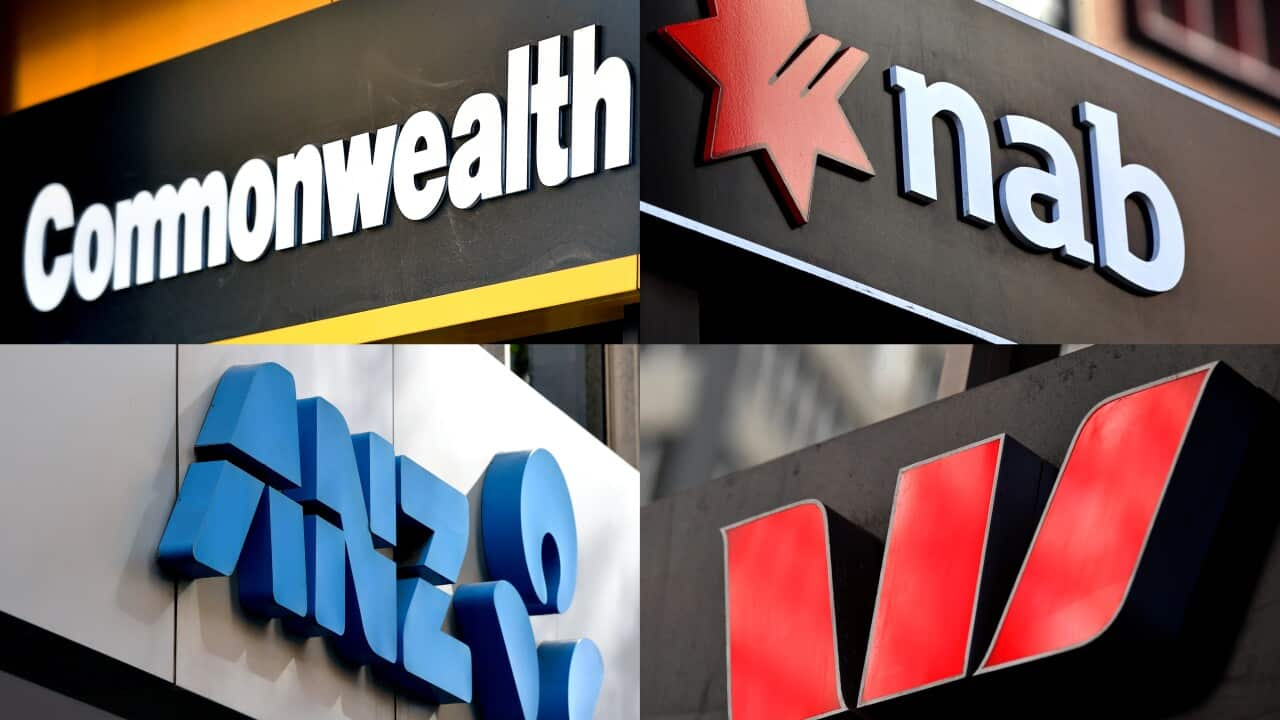Key Points
- Australia's big four banks took home a combined $16 billion in six months.
- Westpac is the latest to post its earnings report, announcing its first-half profit rose 22 per cent to $4 billion.
- Increases in the official cash rate helped drive bank profits.
Australia’s 'big four' banks have profited from rising inflation during a national cost of living crisis, taking home a combined $16 billion in six months — about $60,000 a minute.
Westpac is the latest to post its earnings report, announcing on Monday its first-half profit rose 22 per cent to $4 billion, defying expectations that banking profits would cool off with its best half-year result since 2018.
The National Australia Bank (NAB) and ANZ released their results last week, with NAB recording a half-yearly profit of just over $4 billion, an increase of 17 per cent, while ANZ’s earnings lifted 23 per cent to $3.8 billion in the same period.
The Commonwealth Bank reported a $5.2 billion half-year result earlier this year, up 9 per cent. The bank is due to provide a trading update this week.
Increases in the official cash rate, , led to bigger banks charging borrowers more for loans than what they pay savers, creating significant profits for the lenders.
hikes have created major pain for Australians however, such as mortgages, food and medication.
The Australian banking structure has been fairly stable and very secure and “high profits is the price you pay for that", said Professor Paul Kofman, dean of the faculty of business and economics at the University of Melbourne.
“Banks are doing better because the spreads - which is borrowing rates minus lending rates - are going up when interest rates are going up," he said.
“So that is creating a buffer for the banks, because at the same time, there are also people who are getting into trouble with very high interest rates and that would erode banking profits, banks do not stand to benefit from customers going broke."
Concern over the health of the global financial system was raised by UBS Group's takeover of troubled major Swiss bank Credit Suisse in March, and the .
But the RBA, and Treasurer Jim Chalmers, have been that Australia’s banks are strong.
Professor Kofman said Australian banks have been very profitable for a very long time.
“It’s partly a reflection of the market structure of the banks, where you've got four pretty powerful banks.
“That kind of market structure doesn't instil a lot of confidence in a lot of competition between those banks. So there's not that much pressure compared to very competitive markets."
Professor Kofman said banks would stop recording high profits if there is a significant impact of higher interest rates on the ability of banking customers to pay off their home loans.
There are slight indications that these large profits may have missed some investor expectations and that bank profits can’t continue at the same pace.
ANZ chief executive Shayne Elliott has warned “the next six months will be more difficult than the last” given competition for mortgages amid a refinancing boom.
Westpac CEO Peter King flagged thinner profit margins for the bank in future and outlined a cost-cutting target, citing inflation.

Australia’s 'big four' banks have profited from rising inflation during a national cost of living crisis, taking home a combined $16 billion in six months. Source: AAP / Joel Carrett
“Towards the beginning of the rate hikes, we saw the banks put discounts on the table for new customers, in order to attract new business because Australians are in the middle of a refinancing boom," she said.
“In recent weeks, however, they've walked back part of those new customer discounts, because they're, the balance between the cost of borrowing money and providing those discounts to large numbers of customers has taken its toll and they’ve walked some of them back."
Ms Tindall said a lot of Australians have superannuation invested into big banks, so they are a shareholder and “record breaking profits will benefit their super balances as well.”
However Greg Jericho from the Australia Institute said it’s small comfort to consumers that their super is growing, because the money can’t be accessed until people retire and they are feeling the heat of interest rates right now.
Mr Jericho said that banks aren’t the only companies doing very well out of rising inflation.
“What we've seen is that actually, since 2020, basically since the pandemic, all but four industries have seen profits grow faster than wages, " he said.
“It really highlights what we've been arguing which is that corporate profits have been the big drivers of inflation, and cost of living. It's not through strong wages, growth or anything like that.”
Mr Jericho said the Australia Institute has been pushing for the government to introduce a windfall tax on excessive profits.
“When they're making these profits due to things that really have nothing to do with their business - they had nothing to do with the Reserve Bank raising interest rates, but they’re the ones benefiting from it - we would argue that the government should be taxing them at a higher rate."
He said this tax revenue could then be used to support low-income people who are struggling with mortgage payments or higher rents that have come about because of increased interest rates.











